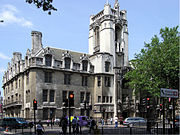Restitution and unjust enrichment is the field of law relating to gains-based recovery. In contrast with damages, restitution is a claim or remedy requiring a defendant to give up benefits wrongfully obtained. Liability for restitution is primarily governed by the "principle of unjust enrichment": A person who has been unjustly enriched at the expense of another is required to make restitution.
A resulting trust is an implied trust that comes into existence by operation of law, where property is transferred to someone who pays nothing for it; and then is implied to hold the property for the benefit of another person.

English tort law concerns the compensation for harm to people's rights to health and safety, a clean environment, property, their economic interests, or their reputations. A "tort" is a wrong in civil law, rather than criminal law, that usually requires a payment of money to make up for damage that is caused. Alongside contracts and unjust enrichment, tort law is usually seen as forming one of the three main pillars of the law of obligations.
Ex turpi causa non oritur actio is a legal doctrine which states that a plaintiff will be unable to pursue legal relief and damages if it arises in connection with their own tortious act. The corresponding Ex turpe causa non oritur damnum, "From a dishonourable cause, no damage arises" is a similar construction. Particularly relevant in the law of contract, tort and trusts, ex turpi causa is also known as the illegality defence, since a defendant may plead that even though, for instance, he broke a contract, conducted himself negligently or broke an equitable duty, nevertheless a claimant by reason of his own illegality cannot sue. The UK Supreme Court provided a thorough reconsideration of the doctrine in 2016 in Patel v Mirza.

English trust law concerns the protection of assets, usually when they are held by one party for another's benefit. Trusts were a creation of the English law of property and obligations, and share a subsequent history with countries across the Commonwealth and the United States. Trusts developed when claimants in property disputes were dissatisfied with the common law courts and petitioned the King for a just and equitable result. On the King's behalf, the Lord Chancellor developed a parallel justice system in the Court of Chancery, commonly referred as equity. Historically, trusts have mostly been used where people have left money in a will, or created family settlements, charities, or some types of business venture. After the Judicature Act 1873, England's courts of equity and common law were merged, and equitable principles took precedence. Today, trusts play an important role in financial investment, especially in unit trusts and in pension trusts. Although people are generally free to set the terms of trusts in any way they like, there is a growing body of legislation to protect beneficiaries or regulate the trust relationship, including the Trustee Act 1925, Trustee Investments Act 1961, Recognition of Trusts Act 1987, Financial Services and Markets Act 2000, Trustee Act 2000, Pensions Act 1995, Pensions Act 2004 and Charities Act 2011.

English contract law is the body of law that regulates legally binding agreements in England and Wales. With its roots in the lex mercatoria and the activism of the judiciary during the Industrial Revolution, it shares a heritage with countries across the Commonwealth, from membership in the European Union, continuing membership in Unidroit, and to a lesser extent the United States. Any agreement that is enforceable in court is a contract. A contract is a voluntary obligation, contrasting to the duty to not violate others rights in tort or unjust enrichment. English law places a high value on ensuring people have truly consented to the deals that bind them in court, so long as they comply with statutory and human rights.

United Kingdom administrative law is part of UK constitutional law that is designed through judicial review to hold executive power and public bodies accountable under the law. A person can apply to the High Court to challenge a public body's decision if they have a "sufficient interest", within three months of the grounds of the cause of action becoming known. By contrast, claims against public bodies in tort or contract are usually limited by the Limitation Act 1980 to a period of 6 years.
The English law of unjust enrichment is part of the English law of obligations, along with the law of contract, tort, and trusts. The law of unjust enrichment deals with circumstances in which one person is required to make restitution of a benefit acquired at the expense of another in circumstances which are unjust.

Hewison v Meridian Shipping Services Pte[2002] EWCA 1821 is an English tort law case, concerning an employer's liability for an employee's illegal acts.

Stone & Rolls Ltd v Moore Stephens[2009] UKHL 39 is a leading case relevant for UK company law and the law on fraud and ex turpi causa non oritur actio. The House of Lords decided by a majority of three to two that where the director and sole shareholder of a closely held private company deceived the auditors with fraud carried out on all creditors, subsequently the creditors of the insolvent company would be barred from suing the auditors for negligence from the shoes of the company. The Lords reasoned that where the company was only identifiable with one person, the fraud of that person would be attributable to the company, and the "company" could not rely on its own illegal fraud when bringing a claim for negligence against any auditors. It was the last case to be argued before the House of Lords.

Resulting trusts in English law are trusts created where property is not properly disposed of. It comes from the Latin resultare, meaning to spring back, and was defined by Megarry VC as "essentially a property concept; any property that a man does not effectually dispose of remains his own". These trusts come in two forms: automatic resulting trusts, and presumed resulting trusts. Automatic resulting trusts arise from a "gap" in the equitable title of property. The equitable maxim "equity abhors a vacuum" is followed: it is against principle for a piece of property to have no owner. As such, the courts assign the property to somebody in a resulting trust to avoid this becoming an issue. They occur in one of four situations: where there is no declaration of trust, where an express trust fails, where there is surplus property, or upon the dissolution of an unincorporated association. Rules differ depending on the situation and the type of original trust under dispute; failed charitable trusts, for example, have the property reapplied in a different way from other forms of trust.

The Criminal Justice Act 1993 is a United Kingdom Act of Parliament that set out new rules regarding drug trafficking, proceeds and profit of crime, financing of terrorism and insider dealing.
Illegality in English law is a potential ground in English contract law, tort, trusts or UK company law for a court to refuse to enforce an obligation. The illegality of a transaction, either because of public policy under the common law, or because of legislation, potentially means no action directly concerning the deal will be heard by the courts. The doctrine is reminiscent of the Latin phrase "Ex turpi causa non oritur actio", meaning "no cause of action arises from a wrong". The primary problem arising when courts refuse to enforce an agreement is the extent to which an innocent party may recover any property already conveyed through the transaction. Hence, illegality raises important questions for English unjust enrichment law.

Tinsley v Milligan[1993] UKHL 3 is an English trusts law case, concerning resulting trusts, the presumption of advancement and illegality.

Hall v Hebert is a leading tort law case decided by the Supreme Court of Canada on the defences of contributory negligence and ex turpi causa non oritur actio.
Relfo Ltd v Varsani [2014] EWCA Civ 360 is an English unjust enrichment law case, concerning to what extent enrichment of the defendant must be at the expense of the claimant.

Jetivia SA v Bilta (UK) Limited [2015] UKSC 23 is a UK company and insolvency law decision of the Supreme Court of the United Kingdom in relation to (i) the attribution of unlawful acts of a director to the company where the company is the victim of the unlawful act, and (ii) the extent to which liability for fraudulent trading under section 213 of the Insolvency Act 1986 has extraterritorial effect.
Hall v Woolston Hall Leisure Ltd [2000] EWCA Civ 170 is a UK labour law case, concerning the illegality in the contract of employment.

Singularis Holdings Limited v Daiwa Capital Markets Europe Limited[2019] UKSC 50 is a judicial decision of Supreme Court of the United Kingdom relating to the duties owed by a bank where a person acting on behalf of a corporate customer of the bank directs the bank to transfer money out of the company's account as part of a fraudulent scheme.

Lord Napier and Ettrick v Hunter [1993] AC 713 was a judicial decision of House of Lords relating to the right of subrogation where an insurer pays with respect to an insured risk and the assured later recovers damages from a third party with respect to that same loss. The case also determined that the right of subrogation is fortified by an equitable lien over the proceeds of the claim against the third party.












